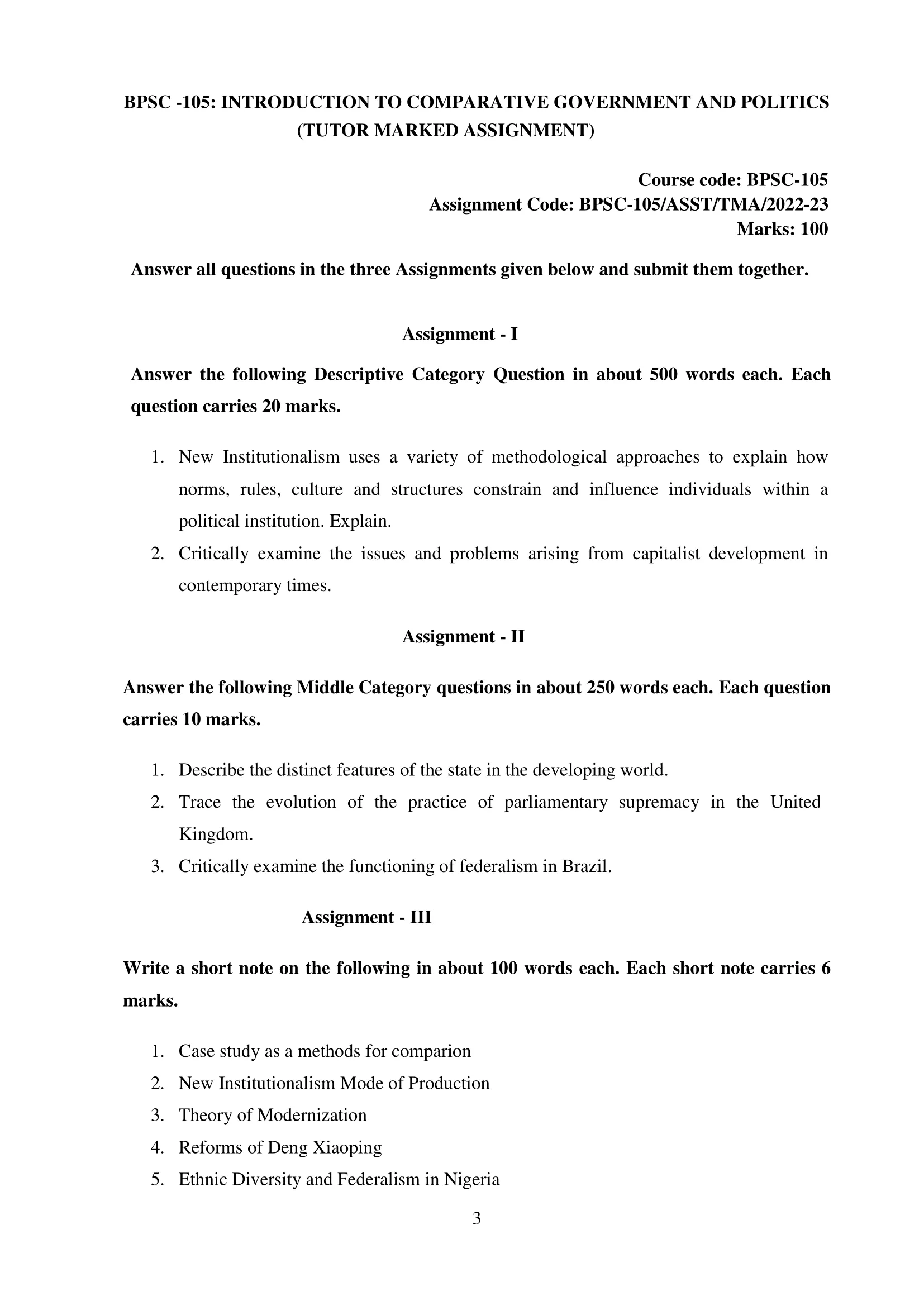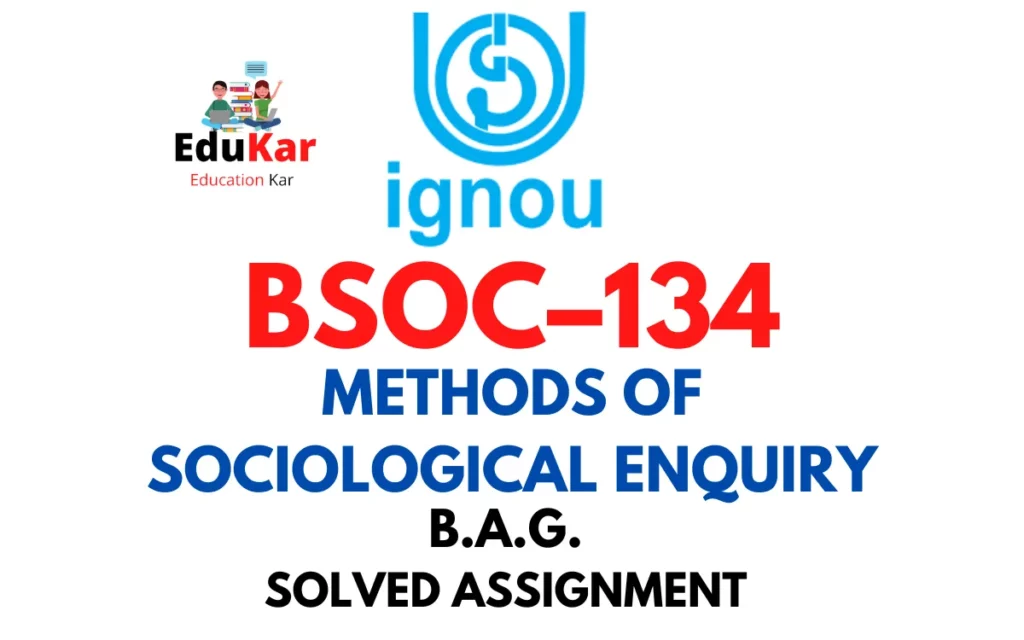Contents
- 1 Assignment – I
- 2 Answer the following Descriptive Category Question in about 500 words each. Each question carries 20 marks.
- 3 1. New Institutionalism uses a variety of methodological approaches to explain how norms, rules, culture and structures constrain and influence individuals within a political institution. Explain.
- 4 2. Critically examine the issues and problems arising from capitalist development in contemporary times.
- 5 Assignment – II
- 6 Answer the following Middle Category questions in about 250 words each. Each questioncarries 10 marks.
- 7 1. Describe the distinct features of the state in the developing world.
- 8 2. Trace the evolution of the practice of parliamentary supremacy in the United Kingdom.
- 9 3. Critically examine the functioning of federalism in Brazil.
- 10 Assignment – III
- 11 Write a short note on the following in about 100 words each. Each short note carries 6 marks.
- 12 1. Case study as a methods for comparion
- 13 2. New Institutionalism Mode of Production
- 14 3. Theory of Modernization
- 15 4. Reforms of Deng Xiaoping
- 16 5. Ethnic Diversity and Federalism in Nigeria

| Title | BPSC-105: IGNOU BAG Solved Assignment 2022-2023 |
| University | IGNOU |
| Degree | Bachelor Degree Programme |
| Course Code | BPSC-105 |
| Course Name | INTRODUCTION TO COMPARATIVE GOVERNMENT AND POLITICS |
| Programme Name | Bachelor of Arts (General) |
| Programme Code | BAG |
| Total Marks | 100 |
| Year | 2022-2023 |
| Language | English |
| Assignment Code | BPSC-105/ASST/TMA/2022-23 |
| Last Date for Submission of Assignment: | For June Examination: 31st April For December Examination: 30th September |

Assignment – I
Answer the following Descriptive Category Question in about 500 words each. Each question carries 20 marks.
1. New Institutionalism uses a variety of methodological approaches to explain how norms, rules, culture and structures constrain and influence individuals within a political institution. Explain.
Ans: New Institutionalism is a theoretical framework that seeks to understand how political institutions and their internal structures, rules, norms, and culture constrain and influence individual behavior. New Institutionalism is not a single, unified theory but a broad umbrella term for a variety of methodological approaches, including rational choice institutionalism, historical institutionalism, and sociological institutionalism.
Rational choice institutionalism posits that individuals act rationally and strategically in response to the incentives and disincentives provided by institutional structures, rules, and norms. This approach emphasizes the importance of formal rules, such as laws and regulations, in shaping individual behavior. According to rational choice institutionalism, individuals will weigh the costs and benefits of different options and make decisions based on their own self-interest.
Historical institutionalism, on the other hand, emphasizes the importance of path dependence and critical junctures in shaping institutional development. This approach argues that past decisions and events can have long-lasting effects on institutional structures and norms, and that institutions are often resistant to change. Historical institutionalists focus on the role of informal rules and norms, such as traditions and customs, in shaping individual behavior.
Sociological institutionalism emphasizes the importance of social and cultural factors in shaping individual behavior within institutions. This approach argues that institutions are not just formal structures and rules, but also include informal norms and cultural values. According to sociological institutionalism, individuals are socialized into institutional roles and norms, and these roles and norms shape their behavior.
Overall, New Institutionalism provides a comprehensive framework for understanding how political institutions shape individual behavior. By analyzing the interplay between formal and informal rules, culture, and structure, New Institutionalism helps us understand why individuals act the way they do within institutions, and how institutional change can occur.
2. Critically examine the issues and problems arising from capitalist development in contemporary times.
Ans: Capitalist development has brought significant economic growth and prosperity to many countries, but it has also created various problems and challenges in contemporary times. These issues can be broadly categorized into economic, social, and environmental concerns.
Economically, capitalist development has resulted in growing income inequality, with the benefits of growth primarily accruing to the wealthy. This has led to the concentration of wealth in the hands of a few individuals and corporations, creating a significant gap between the rich and the poor. As a result, many people are excluded from economic opportunities and are unable to access basic necessities such as healthcare and education.
Moreover, capitalist development has also created a situation of job insecurity and instability for many people, particularly in the context of increasing automation and outsourcing. Many low-wage workers are left with precarious employment, inadequate social protections, and minimal job security.
Socially, capitalist development has led to the commodification of social relations, where human interaction is reduced to market exchanges, and social bonds are replaced with transactional relationships. The resulting individualism and loss of community have eroded social trust, leading to greater social fragmentation and a decline in social cohesion.
Additionally, capitalist development has also fostered the creation of consumerism, where people are encouraged to consume more and more goods and services, leading to overconsumption and waste. This has resulted in significant environmental problems such as pollution, deforestation, and climate change.
Finally, the capitalist system has also led to the exploitation and marginalization of various groups, including women, minorities, and indigenous communities. Women are often paid less than men for the same work, and indigenous communities are displaced from their lands to make way for extractive industries. These problems are compounded by the fact that capitalist development is often pursued with little regard for the social and environmental costs of growth.
Assignment – II
Answer the following Middle Category questions in about 250 words each. Each question
carries 10 marks.
1. Describe the distinct features of the state in the developing world.
Ans: The state in the developing world is characterized by several distinct features that set it apart from developed countries. Firstly, the state in the developing world is often weak, inefficient, and lacks institutional capacity. This is due to a combination of factors such as corruption, nepotism, and a lack of resources, among others.
Secondly, the state in the developing world is often highly centralized, with power and decision-making concentrated in the hands of a small group of elites. This can lead to a lack of accountability, limited political participation, and exclusion of marginalized groups.
Thirdly, the state in the developing world is often marked by a lack of social welfare provision and a weak social contract between the state and its citizens. This can result in high levels of poverty, inequality, and social unrest.
Fourthly, the state in the developing world is often subject to external pressures and constraints from international actors, such as donor countries, international organizations, and global financial institutions. This can limit the state’s ability to pursue its own development goals and agendas.
Lastly, the state in the developing world is often characterized by a high degree of volatility and instability, with frequent coups, civil conflicts, and political violence. This can further undermine the state’s capacity and legitimacy, as well as hinder economic and social development.
2. Trace the evolution of the practice of parliamentary supremacy in the United Kingdom.
Ans: The practice of parliamentary supremacy in the United Kingdom has undergone a significant evolution over the centuries. The idea of parliamentary supremacy emerged during the seventeenth century, as Parliament began to assert its authority over the monarchy. However, it was not until the Glorious Revolution of 1688 that parliamentary supremacy became firmly established.
The Bill of Rights, passed in 1689, affirmed the supremacy of Parliament over the monarch and established the principle of regular parliaments. This marked a significant shift in the balance of power between the monarch and Parliament, and laid the foundation for the modern system of parliamentary democracy in the UK.
In the eighteenth century, the power of Parliament continued to grow, as the influence of the landed aristocracy and the monarchy declined. This was a period of significant legislative reform, with Parliament passing a series of important laws on issues such as slavery, the rights of workers, and the regulation of trade.
In the nineteenth century, the power of Parliament expanded further, as the franchise was gradually extended to more and more people. This led to the emergence of a mass democratic movement, which put pressure on Parliament to pass a series of landmark laws, such as the 1832 Reform Act and the 1867 Reform Act.
In the twentieth century, Parliament continued to play a central role in the political life of the UK. The two World Wars and the rise of the welfare state led to significant changes in the relationship between the state and its citizens, and Parliament played a key role in shaping these changes.
Today, parliamentary supremacy remains a cornerstone of the UK’s constitutional system. Although there have been challenges to this principle in recent years, particularly in the context of the UK’s relationship with the European Union, the fundamental importance of Parliament as the ultimate source of authority in the UK has not been seriously called into question.
3. Critically examine the functioning of federalism in Brazil.
Ans: Federalism in Brazil is a complex system of government, where power is divided between the central government and 26 states, as well as the Federal District. The Brazilian Constitution of 1988 established a federal system with a clear distribution of responsibilities between the federal government and the subnational entities.
One of the main advantages of federalism in Brazil is that it allows for a more decentralized system of government, which can lead to better representation of local interests and greater efficiency in the delivery of public services. The subnational entities, particularly the states, have a significant degree of autonomy in managing their own affairs, including the ability to levy taxes, establish their own administrative systems, and provide essential public services such as health care and education.
However, the functioning of federalism in Brazil is not without its challenges. One of the main issues is the significant disparities in resources and development between different states. This has led to a situation where some states are much more economically and politically powerful than others, which can create imbalances in the distribution of resources and opportunities.
Another challenge is the potential for conflict and coordination problems between the federal government and the subnational entities. This can occur when there are disputes over the distribution of resources, or when there are differences in political priorities between the central government and the states.
There have also been concerns about corruption and mismanagement at the subnational level, particularly in some of the less developed states. This can undermine the effectiveness of federalism in Brazil, by reducing the ability of the subnational entities to provide high-quality public services and manage their affairs in a transparent and accountable manner.
Assignment – III
Write a short note on the following in about 100 words each. Each short note carries 6 marks.
1. Case study as a methods for comparion
Ans: Case study is a research method that involves in-depth investigation and analysis of a particular subject or phenomenon. It is often used in social sciences to compare and contrast different cases, and to draw general conclusions about broader trends or patterns. Case study is particularly useful when studying complex phenomena or when there are limited existing theories or data on a particular topic. By examining multiple cases, researchers can identify similarities and differences, and use this information to make comparisons and draw conclusions. However, case study research is often criticized for its limited generalizability and potential for researcher bias.
2. New Institutionalism Mode of Production
Ans: New institutionalism is a theoretical perspective in sociology that focuses on how social institutions shape the behavior of individuals and groups. One application of new institutionalism is in the analysis of the mode of production, which refers to the dominant economic system in a particular society. According to new institutionalism, the mode of production is not simply a matter of economic forces, but is also shaped by social and cultural factors.
New institutionalism argues that the mode of production is not a fixed, static concept, but is rather a dynamic process that is constantly evolving. This is because the way that economic activity is organized is influenced by a range of institutional arrangements, including legal systems, regulatory structures, and social norms. These institutional arrangements can either facilitate or constrain economic activity, and can have a significant impact on the distribution of power and wealth in society.
For example, in a capitalist mode of production, private ownership of the means of production is the dominant form of economic organization. However, the specific forms of capitalism that exist in different societies are shaped by a range of institutional factors, such as labor laws, tax policies, and financial regulations. These institutions can either facilitate or constrain the power of capitalist elites, and can affect the distribution of wealth and income.
New institutionalism also emphasizes the role of ideas and beliefs in shaping economic behavior. This is because institutions are not simply the result of material conditions, but are also shaped by cultural and ideological factors. For example, the legitimacy of a particular mode of production may be influenced by cultural beliefs about the importance of individualism or collectivism, or about the relationship between work and social status.
3. Theory of Modernization
Ans: The theory of modernization is a perspective on social and economic development that emerged in the mid-20th century. It posits that societies progress through a series of stages of development, and that the key to economic and social growth is the adoption of modern technologies, institutions, and values.
According to the theory, traditional societies are characterized by low levels of productivity, limited social mobility, and a focus on agriculture and subsistence living. The theory holds that as societies become more industrialized and urbanized, they move through a series of stages of development, including the establishment of modern political institutions, the growth of industry and technology, and the emergence of a modern culture.
The theory of modernization suggests that economic growth and development are driven by the adoption of modern technologies and institutions, as well as by the spread of modern values such as individualism, rationality, and entrepreneurship. It emphasizes the importance of education, scientific research, and technological innovation as drivers of economic growth.
Critics of the theory of modernization argue that it oversimplifies the complex process of social and economic development and neglects the role of historical, cultural, and political factors in shaping the trajectory of development. They also suggest that the theory can lead to a one-size-fits-all approach to development that does not take into account the unique characteristics and needs of different societies.
4. Reforms of Deng Xiaoping
Ans: Deng Xiaoping was a Chinese statesman who led China from the late 1970s until the early 1990s. During his time in power, he implemented a series of economic and political reforms that had a profound impact on China and the world. Some of the key reforms of Deng Xiaoping include:
- Market-oriented economic reforms: Deng Xiaoping initiated a series of market-oriented economic reforms, which were aimed at increasing economic efficiency and productivity. These reforms included the introduction of a household responsibility system in agriculture, the establishment of special economic zones, and the decentralization of economic decision-making.
- Opening up to the world: Deng Xiaoping believed that China needed to open up to the world and integrate into the global economy in order to achieve economic growth and development. He established diplomatic relations with the United States, Japan, and other major powers, and encouraged foreign investment and trade.
- Political reforms: Deng Xiaoping also implemented political reforms aimed at modernizing China’s political system. These reforms included the adoption of a new constitution, the establishment of a legal system, and the promotion of greater transparency and accountability in government.
- One-child policy: In order to control China’s rapidly growing population, Deng Xiaoping introduced the one-child policy in 1979. This policy restricted most couples to having only one child, and was strictly enforced through a range of measures, including fines and penalties.
- Military modernization: Deng Xiaoping also initiated a major military modernization program, aimed at modernizing China’s armed forces and making them more technologically advanced.
5. Ethnic Diversity and Federalism in Nigeria
Ans: Nigeria is a country with a complex ethnic and cultural diversity. It has over 250 ethnic groups, with the largest being the Hausa-Fulani, Yoruba, and Igbo. The ethnic diversity has often been a source of tension and conflict in Nigeria, especially in the areas of political power, resource allocation, and distribution of benefits.
One response to the ethnic diversity in Nigeria has been the adoption of a federal system of government. The Nigerian federal system of government was established in 1954, which devolved powers to the federal government and state governments. The federal system was designed to give ethnic groups greater control over their affairs, and to promote a more equitable distribution of resources and political power.
However, the federal system has faced challenges in managing the ethnic diversity in Nigeria. There have been tensions between the federal government and the state governments over issues such as resource allocation and political power. Additionally, there have been conflicts between different ethnic groups over access to resources, land, and political power. These conflicts have often resulted in violence and social unrest.
To address these challenges, there have been calls for greater decentralization of power to the state and local government levels, which would allow ethnic groups to have more control over their affairs. There have also been calls for greater dialogue and reconciliation among ethnic groups, to promote understanding and reduce tensions.
How to Download BPSC-105 Solved Assignment?
You can download it from the www.edukar.in, they have a big database for all the IGNOU solved assignments.
Is the BPSC-105 Solved Assignment Free?
Yes this is absolutely free to download the solved assignment from www.edukar.in
What is the last submission date for BPSC-105 Solved Assignment?
For June Examination: 31st April, For December Examination: 30th October
















